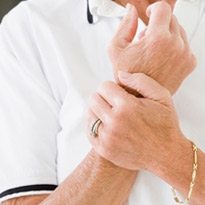There are 8 common symptoms of Rheumatoid Arthritis. In this video, Clint discusses these common symptoms and what to do about them – including the removal of common Rheumatoid Arthritis nodules.
The 8 Most Common Rheumatoid Arthritis Symptoms:
1. Heat
Joints with RA tend to feel noticeably warmer then the unaffected joints. Place a cool hand over the joint in question and observe the presence of heat
2. Swelling
A symptom that is most associated with RA joints is swelling. The swelling occurs due to an excess of synovial fluid in addition to a swollen synovial lining.
3. Pain
The pain in an arthritic joint can be tremendous, especially after a period of inactivity
4. Reduced Range of Motion
As the joint heats and swells, the space that is normally available for the bone structures to move gets occupied by soft tissue and fluid. In addition, the presence of inflammation in the area causes the connective muscles, tissues and ligaments to lock up in an attempt to protect the joint. This combination causes the joints to lose their range of motion.
5. Redness

6. Opposite Joints Effected
It is common for Rheumatoid Arthritis to occupy equivalent joints on both sides of the body. For instance, RA in the fingers or feet on one side of the body is commonly seen in the exact same joints on the other side of the body.
7. Nodules
Nodules are hardened and bulging areas around the joint that occur after an extended disease presence. Some Rheumatologists recommend that these can be ‘rubbed’ out through gentle massage but my personal experience with RA nodules is to address them the same way as addressing other aspects of the disease and that is heal the underlying cause. My joint nodules disappeared, along with many other RA symptoms, by healing my intestinal environment first
8. Fatigue – In addition to the external symptoms of Rheumatoid Arthritis there is also the additional challenge of fatigue. The body becomes tired for several reasons. Firstly, the immune system is in an overactive state as it relentlessly attacks the own body’s tissues in a state of innocent confusion. Secondly, the body is dealing with the elimination of particles that are getting into the blood stream, signaling the need to create many antibodies to invading antigens and eliminate the resulting circulating immune complexes from the body. In addition, a body that has resulted in RA typically is low on enzymatic activity, which are the catalysts to all cellular operation in the body. The cumulative effect of these activities results in a feeling of sluggishness and heaviness that makes even simple tasks seem challenging.
You can improve your RA symptoms dramatically through a change of diet and some unique and specific healing foods for RA. There are also some exercises for Rheumatoid Arthritis that can reduce morning stiffness rapidly and relax the muscle stiffness around damaged joints. More on these topics on other blogs, or you can get the Paddison Program for Rheumatoid Arthritis which covers all of these topics in the greatest detail.
Clint and Melissa Paddison
Disclaimer: Do not take this information as personal medical advice. Do not change your diet if you are ill or on medication without the advice of a qualified health care provider (your physician, for example).

